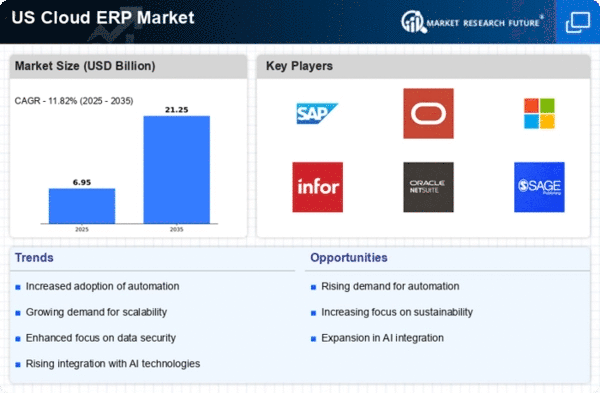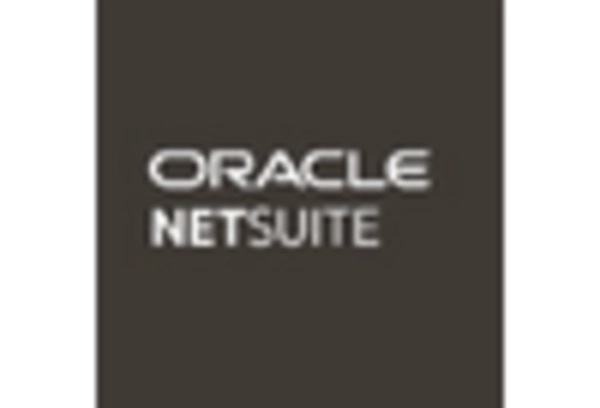Cost Efficiency and Scalability
Cost efficiency remains a critical driver in the cloud erp market. Organizations are increasingly recognizing the financial advantages of cloud-based ERP systems, which often require lower upfront investments compared to traditional on-premises solutions. The cloud erp market shows that businesses can save up to 30% on IT costs by transitioning to cloud solutions. Additionally, the scalability offered by cloud ERP systems allows companies to adjust their resources according to changing business needs without incurring significant expenses. This flexibility is particularly appealing to small and medium-sized enterprises (SMEs) that may face budget constraints. As a result, the cloud erp market is likely to continue growing as more organizations seek cost-effective and scalable solutions.
Focus on Enhanced User Experience
User experience has emerged as a pivotal factor in the cloud erp market. Organizations are increasingly prioritizing systems that offer intuitive interfaces and user-friendly features. The cloud erp market indicates that companies with a strong focus on user experience can achieve higher employee satisfaction and productivity. Approximately 60% of users report that a seamless interface significantly impacts their ability to perform tasks efficiently. As businesses recognize the importance of user-centric design, cloud ERP providers are likely to invest in enhancing their platforms to meet these expectations. This focus on user experience not only improves adoption rates but also fosters a more engaged workforce, ultimately contributing to the overall success of the organization.
Integration with Emerging Technologies
The integration of emerging technologies is driving innovation within the cloud erp market. Companies are increasingly looking to incorporate advanced technologies such as artificial intelligence (AI), machine learning, and the Internet of Things (IoT) into their ERP systems. This trend is evident in the cloud erp market, where approximately 40% of organizations are investing in AI-driven ERP solutions to enhance decision-making and operational efficiency. By leveraging these technologies, businesses can gain deeper insights into their operations, streamline processes, and improve customer experiences. The potential for enhanced functionality and automation positions cloud ERP systems as essential tools for organizations aiming to stay ahead in a competitive landscape.
Growing Demand for Remote Work Solutions
The cloud erp market is experiencing a notable surge in demand for remote work solutions. As organizations increasingly adopt flexible work arrangements, the need for accessible and efficient ERP systems has become paramount. This shift is reflected in the market data, which indicates that approximately 70% of companies in the US are now prioritizing cloud-based solutions to facilitate remote operations. The cloud erp market is thus adapting to meet these evolving needs, providing tools that enable seamless collaboration and data sharing among remote teams. Furthermore, the ability to access ERP systems from any location enhances productivity and operational efficiency, making cloud solutions an attractive option for businesses aiming to maintain competitiveness in a rapidly changing work environment.
Regulatory Compliance and Risk Management
Regulatory compliance is a critical concern for organizations operating in the cloud erp market. As businesses face increasing scrutiny from regulatory bodies, the need for robust compliance features within ERP systems has become essential. The cloud erp market suggests that approximately 50% of organizations prioritize compliance capabilities when selecting an ERP solution. This focus on compliance not only mitigates risks associated with data breaches and legal penalties but also enhances the overall credibility of the organization. As regulations continue to evolve, cloud ERP providers are likely to enhance their offerings to ensure that clients can navigate the complex landscape of compliance effectively, thereby fostering trust and reliability in their systems.

















